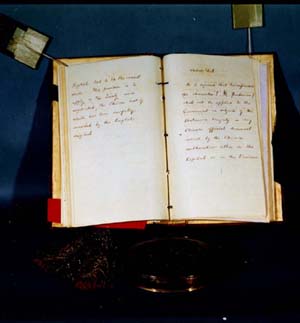CASE 4: China and International Law in the 19th Century
by Lydia Liu (Columbia University)
|

Article 51 of the English text of the 1858 Treaty of Tianjin.
Courtesy of the National Palace Museum, Taiwan, ROC.
Imagine the French government demanded that the United States not use the word “alien” with respect to the French government or any French citizen? Americans might find the notion silly, but the French could argue that “alien” is not just the technical word for “foreigner,” but is really a term with very negative connotations, as shown in films featuring “alien” monsters from outer space. Suppose further that the French were willing to go to war to make it illegal for the United States to use this word? If you can imagine this, then you have some idea of what faced Chinese negotiators in the mid-nineteenth century. In this section you will learn why international treaties can be so concerned with words. You will learn how the British introduced a formal ban on the written Chinese character ? (yi in pinyin) and then consider for yourself whether the word yi meant “barbarian” or something else. You will learn how the competing claims of great empires helped to shape the development of international law. Finally, you will learn about the role translation played during the Opium Wars that were fought between Britain and China in the nineteenth century. |
Want to know more? Have a look at the next page:
|
|